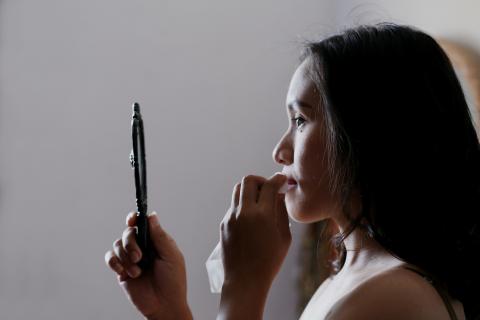
~ 2 minute read
This article was originally published in Autism Matters in 2016.
Have you tried on makeup and it felt unbearably thick on your face? Or maybe there’s uncomfortable tingling/itching. One testimony from an Aspie who was interviewed for the book Aspergirls (one of my favourite books ever) mentioned that she wanted to claw makeup off her face when she tried it. One of the distinguishing traits associated with Autism Spectrum Disorder (ASD) is having a particular sensitivity. This can vary from person to person. Some good examples include sound sensitivity and touch sensitivity. In the case of makeup or other personal care products, if you
have a reaction to them, your reaction is also a tactile kind.
Others may consider this wacky but this kind of reaction to personal care items and cosmetics might actually be a very good body defense mechanism that is letting you know that you should not be applying this soap, lipstick, etc. on your body. I learned from a couple of moms who have taught children on the autism spectrum as well as from an organic make-up artist, that there are many chemicals which are not good for your skin that are in a lot of beauty and personal care products. This happens because there is no seriously-enforced legislation on what goes into these kinds of products.
But don’t worry. This is not the case for every personal care or beauty product. I’ve got a variety of products from different brands, from L’Oréal Paris to Covergirl to Burt’s Bees. How can you figure out what are some good cosmetic/care products the next time you go shopping? Do you have to buy very expensive organic products? The answer is no, you don’t necessarily have to buy costly organic products (unless that is the only thing that your body will not react to) and the sidebar on this page lists some chemicals to look out for the next time you go shopping.
How can you figure out if any of these are in a product? There are some basic things that you can do. First, look at the ingredients list of whatever it is you are thinking about purchasing. Or look at any labels on the product stating something like “paraben free.” If neither of these are on the product itself, you can always look up the product’s ingredients online, usually on the website of the company that makes the product or if not, on drugstore.com (I’ve found that website very handy). Make sure that the website is a legit one (e.g. there’s a company address provided somewhere at the bottom of the page). If organic products are the only thing that you can apply on yourself, Burt’s Bees is a good go-to brand that is not too expensive.
| What to Avoid |
|---|
|
To avoid products that may cause sensitivities, look out for these items on product labels.
This list of chemicals came from a cosmetics paper published by Queen’s University (The Perils of Cosmetics). |
These tips are for those who are interested in personal care/makeup but found that they are sensitive to, or even get reactions from such products. Perhaps you just want to live a healthier lifestyle. I hope that these tips will help and that you start feeling better skin-wise and mentally. When you feel good inside, it gets reflected on the outside.
About Courtney Weaver
Courtney Weaver was born in Lahr, Germany on July 9th, 1992 and was raised in Ottawa. She is from a family of five and she has two younger sisters, one of whom was diagnosed with PDD-NOS. She herself was diagnosed with Asperger’s Syndrome before she was five years old. After completing her elementary and secondary schooling in Ottawa, she embarked on university studies. She first obtained a Bachelor’s of Arts Honours degree in History at Queen’s University in Kingston, soon followed by a Master’s degree in Critical Disability Studies at York University. Her favourite pastime activities include working out, reading, doing something artistic, bicycle riding, puns and walking. She consistently tries to balance doing familiar comfortable habits with trying new things to get out of her comfort zone. She has been passionate about autism as a cause since Queen’s University and her life goal is to advocate and support others on the spectrum and those closest to them.
DISCLAIMER: This document reflects the views of the author. It is Autism Ontario’s intent to inform and educate. Every situation is unique and while we hope this information is useful, it should be used in the context of broader considerations for each person. Please contact Autism Ontario at info@autismontario.com or 416-246-9592 for permission to reproduce this material for any purpose other than personal use. © 2020 Autism Ontario 416.246.9592 www.autismontario.com

